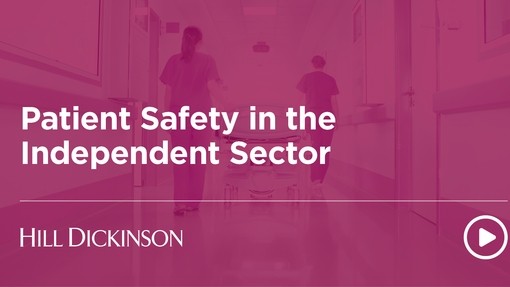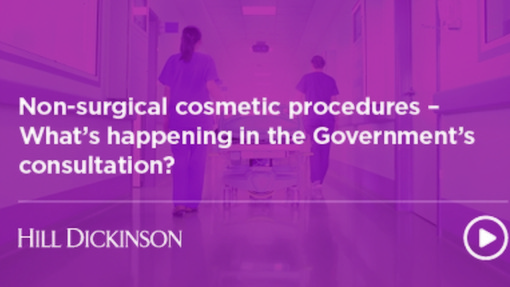Planning for ESG – what healthcare practitioners in private practice should be considering

Planning for ESG – what healthcare practitioners in private practice should be considering
This article was originally published for Independent Practitioner Today.
As governments, organisations, and individuals around the world focus more on ESG, it is becoming increasingly important to understand what this is and how its principles apply on a practical level. This is the case no matter the sector in which we work or the scale on which we do so.
The independent healthcare sector, as a major potential contributor, both positively and negatively to goals associated with ESG is no exception.
For larger organisations bidding for public sector contracts, looking to secure finance or satisfy shareholders, there are already many compulsory hoops to jump through relating, for example to net zero or social value targets and activity.
That portion of the sector is becoming more attuned to this need and adapting accordingly with whole teams of individuals tasked with doing so.
But what about individual healthcare practitioners working independently and/or at a much smaller scale? What do they need to know, why should they know it, and what are the practical steps which can be taken now to respond to the ESG imperative?
What is ESG?
ESG initiatives encompasses a huge area of focus taking their starting point from the United Nations 17 Sustainable Development Goals, ranging from the elimination of poverty to clean sanitation, gender equality, climate action, sustainable cities and communities, and good health and well-being.
It is a framework within which organisations can demonstrate a shift in emphasis of their operations from short-term profit maximisation as the primary objective of a business model with to? positive societal impact from an environmental, social and governance perspective.
There are, increasingly, non-negotiable reasons for building this shift into business operations, for example needing to demonstrate credentials in this area to be considered for contract opportunities, together with less pressing.
But equally important reasons for that focus surrounding the moral imperative to positively influence the communities in which organisations operate.
Why the smaller scale focus?
Healthcare professionals practising on a smaller scale may be tempted (or given workloads, too busy) to assume that they either need not or cannot influence ESG factors in their work or that doing so is something which can be put off to another day.
But this is not the case. While they may not have immediately pressing compulsory targets to satisfy, this may change going forwards.
For example, if supplying services to the NHS, from April 2023 the NHS will require all suppliers with a contract value of £5 million plus to publish a carbon reduction plan for their direct emissions. Similarly, the NHS target of achieving net carbon zero for its carbon footprint plus (that is the emissions within its supply chain which it does not control directly) by 2045 and stated plans to no longer purchase from suppliers who do not meet or exceed its carbon zero commitment by 2030.
Also, to be considered are targets set by larger independent sector organisations if they envisage supplying services to them. In relation to these targets, it is also worth remembering that steps to conform to targets such as these cannot be met overnight and thought therefore needs to be given to it now. The UK Government has also set a binding target to reach net zero emissions by 2050.
And there are, likewise, many positive reasons to focus on ESG now as viewed from both a moral perspective and in terms of responding to increasing staff and consumer awareness of the agenda.
Doing so can prove a rewarding endeavour either resulting from satisfaction at ‘doing the right thing’ or increased ability to attract and retain patients and staff who view ESG aims as important and want to use providers who share that belief.
What can independent practitioners do?
From an individual practitioner perspective, the key areas to target are environmental and social. While some goals may not be achievable overnight, the key action is pulling together a plan to achieve them. In terms of carbon reduction, this should include analysing your baseline to see where you are now and starting to draft a carbon reduction plan.
Stage one is understanding what the relevant goals and targets are and mean, and who is setting them.
For example, as we have already noted the NHS target to reduce its carbon footprint to net zero by 2045, but it is also targeting an 80% reduction of this between 2036 and 2039 and intends a target of net zero by 2040 for the emissions it does control. These targets are ambitious, with the NHS aiming to be the world’s first net zero public health service.
Closer to home, the Independent Healthcare Providers Network (IHPN) has announced an industry-wide commitment for independent healthcare providers to go beyond the NHS target to achieve net zero by 2035 (with a net zero supply chain by 2045) with some members committing beyond that ambitious target to achieve net zero by 2030.
With consumers taking note, there could be competitive advantage in demonstrating commitment and that practical measures are being taken, both in terms of attracting patients and staff.
This being the case, stage two is taking steps (or planning to do so), but what might these be?
From an environmental perspective there are many areas to target, for example considering more environmentally friendly products such as low plastic, low emissions (for example in respect of anaesthetics and inhalers) alternatives and re-usable rather than single use products. Another area to look into is the process of re-manufacturing – a step beyond recycling which involves breaking down products or their components before restoring them to useful life, and which is currently being trialled for healthcare products including neonatal monitors and a range of surgical tools. Engaging with relevant suppliers now would be a useful initial stage in the plan.
A further area to consider is the use of digital options, including for consultations and treatments, for example apps for use in the treatment of mental health conditions or for physiotherapy.
This enables carbon reductions to be made through reducing the need for patients to travel to access services and is something which will likely have increased as a result of Covid in any event, so likely an evolution rather than entirely new step to build into the plan.
Also worth considering is energy sourcing – can a move to entirely renewable sources of supply be made and to using electric vehicles?
From the social perspective, getting involved with supporting local communities is a clear step to take if that is not already happening. Considering employment practices and whether there are ways to adjust these to ensure that they support the entry of underrepresented or disadvantaged groups into the workforce, is another point to bear in mind.
Beware greenwashing!
The above, non-exhaustive list of proposals for ‘ticking’ ESG boxes is a good starting point, but it is essential to remember that responding to ESG concerns is more than a tick box exercise.
You may have heard the term ‘greenwashing’ which involves presenting an environmentally responsible public image when this is not the case. This is problematic both from a legal perspective, as a breach of consumer rights legislation and advertising standards, and reputationally as organisations engaging in such activity have been recently named and shamed in the press.
Where does this leave us?
This summary has flagged reasons for healthcare practitioners to take note of the ESG agenda together with a few of the measures which you might want to initiate to respond in the shorter term.
However, the most important first step is having a plan for steps which can be taken, encompassing review of what might be possible or desirable from the perspective of your practice.
Engaging with consumers and employees to finalise the plan is likely also to prove productive, as will their enthusiasm for taking it forward. The task in hand may appear daunting at first but taking initial steps towards doing so will ensure that the overall goals can be achieved in the longer term.






